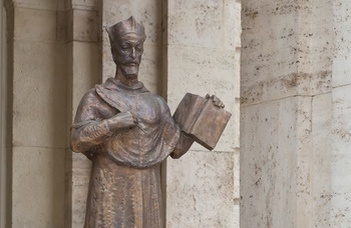The Pázmány Day Assembly of the Senate of ELTE with the conferral of honorary doctorates will take place at 9 May.
At the ceremony, one of the university's distinguished professors delivers a lecture on their own research area every year. This year, the event will be opened by rector László Borhy. After that, Pál Raczky, professor at the Institute of Archaeological Sciences will present his research. He was awarded the University's Jubilee Silver Memorial Medal.
Following the lecture, the ”Doctor et Professor Honoris Causa” awards will be handed out. The university awards this title to scholars of great influence who generally have had fruitful relationships with ELTE for several decades.
Our New Honorary Doctors
- András Arató, social scientist, professor at The New School for Social Research
- Francisco Beltrán Lloris, archaeologist, professor at University of Zaragoza,
- Koen Lenaerts, law scholar, professor at the Catholic University of Leuven,
- Lynn McAlpine, educational scienctist, professor at University of Oxford and McGill University
The Choir of the Institute of Arts Communication and Music at the ELTE Faculty of Humanities will perform at the event. Conductor: Kabdebó Sándor, Habil. Associate Professor
Pál Raczky is an internationally renowned scholar specialising in the European Neolithic and Copper Age, and a distinguished researcher of cultural interactions within the Balkans and Aegean regions. He holds the title of Professor Emeritus at the Faculty of Humanities, and has been engaged in archaeological excavations since his secondary school years. He earned his degree in Archaeology and Mathematics-Physics from ELTE in 1974 and obtained his university doctorate in Prehistoric Archaeology in 1977. His excavations at Polgár-Csőszhalom, the northernmost known Neolithic settlement mound in Europe, garnered significant international recognition. In this context, he organized an international conference in Budapest in collaboration with the Deutsches Archäologisches Institut, Eurasien Abteilung. The proceedings of this conference, published in Bonn, received widespread European acclaim. Recognising the importance of public engagement in scientific research, he curated multiple international exhibitions showcasing Neolithic tells in Hungary and their cultural interconnections with Southeastern Europe. Subsequently, he played a pivotal role in the conceptualisation and establishment of the M3 Archeopark near Polgár-Csőszhalom. These contributions have earned him numerous international distinctions, including his election as a permanent member of the Polish Academy of Arts and Sciences. From 1995, as the head of the department, and from 2005 to 2014, as the director of the Institute of Archaeology, he was instrumental in the institute’s development and the promotion of interdisciplinary research methodologies. He significantly contributed to the comprehensive representation of all historical periods, from the Paleolithic to the early Modern Age, in both teaching and research at the university. Furthermore, he facilitated the initiation of major international projects. In 2023, he was awarded the Széchenyi Prize in recognition of his pioneering contributions to archaeological scholarship. His academic career has been characterized by openness to innovative analytical methods and theories. He is currently researching the internal spatial organisation, local stratigraphy, and past ecological conditions of large Neolithic settlements in the southern Great Plains of Hungary. This work employs advanced remote sensing and geophysical techniques within the framework of Hungarian-German collaboration.
You can read about the work of the university's honorary doctors on
the following link.

